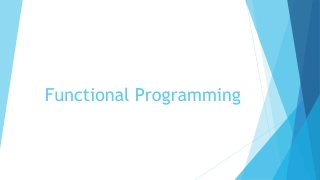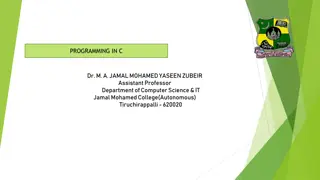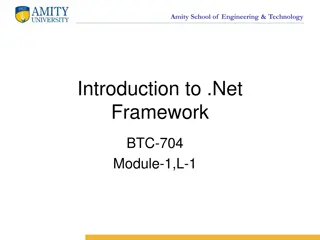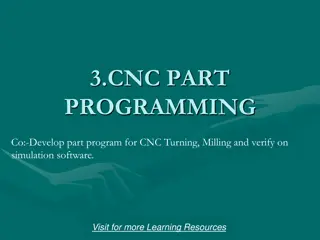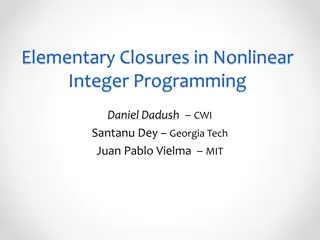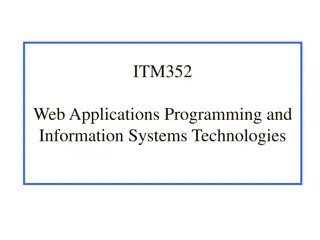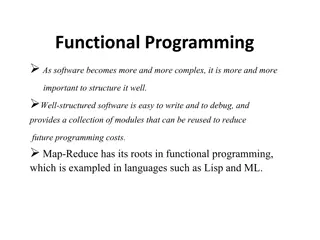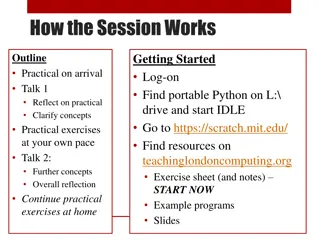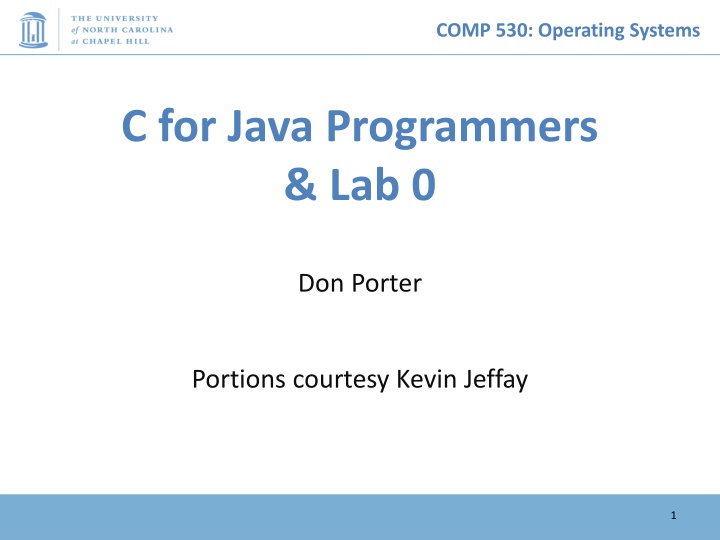
Operating Systems in C for Java Programmers
Learn the basic syntax, data types, pointers, memory placement, and function pointers in C for Java programmers through COMP.530 Operating Systems. Explore creating new data types using typedef, memory allocation in stack and heap, usage of function pointers, and more.
Download Presentation

Please find below an Image/Link to download the presentation.
The content on the website is provided AS IS for your information and personal use only. It may not be sold, licensed, or shared on other websites without obtaining consent from the author. If you encounter any issues during the download, it is possible that the publisher has removed the file from their server.
You are allowed to download the files provided on this website for personal or commercial use, subject to the condition that they are used lawfully. All files are the property of their respective owners.
The content on the website is provided AS IS for your information and personal use only. It may not be sold, licensed, or shared on other websites without obtaining consent from the author.
E N D
Presentation Transcript
COMP 530: Operating Systems C for Java Programmers & Lab 0 Don Porter Portions courtesy Kevin Jeffay 1
COMP 530: Operating Systems Same Basic Syntax Data Types: int, char, [float] void - (untyped pointer) Can create other data types using typedef No Strings - only char arrays Last character needs to be a 0 Not 0 , but \0
COMP 530: Operating Systems struct C s object typedef struct foo { int a; void *b; void (*op)(int c); // function pointer } foo_t; // <------type declaration Actual contiguous memory Includes data and function pointers
COMP 530: Operating Systems Pointers Memory placement explicit (heap vs. stack) Two syntaxes (dot, arrow) int main { struct foo f; struct foo *fp = &f; f.a = 32; // dot: access object directly fp->a = 33; // arrow: follow a pointer fp = malloc(sizeof(struct foo)); fp->a = 34; } Stack Heap main: f: a = 32; b = NULL; op = NULL; op = NULL; f: a = 33; b = NULL; struct foo: a = 34; b = NULL; f: a = 0; b = NULL; op = NULL; struct foo: a = 0; b = NULL; op = NULL; op = NULL; Ampersand: Address of f PC fp: struct foo { int a; void *b; void (*op)(int c); } 4
COMP 530: Operating Systems Function pointer example fp->op = operator; fp->op(32); // Same as calling // operator(32); Stack Heap main: f: a = 32; b = NULL; op = NULL; op = NULL; f: a = 33; b = NULL; f: a = 0; b = NULL; op = NULL; struct foo: a = 34; b = NULL; op = NULL; op = struct foo: a = 34; b = NULL; fp: Code in memory: Main Operator: ... struct foo { int a; void *b; void (*op)(int c); } 5
COMP 530: Operating Systems More on Function Pointers C allows function pointers to be used as members of a struct or passed as arguments to a function Continuing the previous example: void myOp(int c){ /* */ } /* */ foo_t *myFoo = malloc(sizeof(foo_t)); myFoo->op = myOp; // set pointer /* */ myFoo->op(5); // Actually calls myop
COMP 530: Operating Systems No Constructors or Destructors Must manually allocate and free memory - No Garbage Collection! void *x = malloc(sizeof(foo_t)); sizeof gives you the number of bytes in a foo_t - DO NOT COUNT THEM YOURSELF! free(x); Memory allocator remembers the size of malloc ed memory Must also manually initialize data Custom function memset(x, 0, sizeof(*x)) will zero it
COMP 530: Operating Systems Memory References . - access a member of a struct myFoo.a = 5; & - get a pointer to a variable foo_t * fPointer = &myFoo; -> - access a member of a struct, via a pointer to the struct fPointer->a = 6; * - dereference a pointer if(5 == *intPointer){ } Without the *, you would be comparing 5 to the address of the int, not its value.
COMP 530: Operating Systems Int example Stack int x = 5; // x is on the stack int *xp = &x; *xp = 6; printf( %d\n , x); // prints 6 xp = (int *) 0; *xp = 7; // segmentation fault PC main: x: 5 x: 6 xp: xp: NULL 9
COMP 530: Operating Systems Memory References, cont. [] - refer to a member of an array char *str = malloc(5 * sizeof(char)); str[0] = a ; Note: *str = a is equivalent str++; increments the pointer such that *str == str[1] str str+1 str+2 str+3 str+4 str[0] str[1] str[2] str[3] str[4]
COMP 530: Operating Systems The Chicken or The Egg? Many C functions (printf, malloc, etc) are implemented in libraries These libraries use system calls System calls provided by kernel Thus, kernel has to reimplement basic C libraries In some cases, such as malloc, can t use these language features until memory management is implemented
COMP 530: Operating Systems For more help man pages are your friend! (not a dating service)! Ex: man malloc , or man 3 printf Section 3 is usually where libraries live - there is a command-line utility printf as well Use apropos term to search for man entries about term The C Programming Language by Brian Kernighan and Dennis Ritchie is a great reference.
COMP 530: Operating Systems Lab 0 Overview C programming warm-up Hello world program Plus get your current process ID and working directory 13
COMP 530: Operating Systems Working on Homework Assignments This semester we will use Docker If you did learncli in comp211, similar infrastructure Same image for 530 You are welcome to use your own laptop, but code must work in the COMP 530 docker environment Will be the same in autograder
COMP 530: Operating Systems Checking out the starter code Once you have a github account registered Make sure you accept the invite: Click https://github.com/comp530-f24 Click the link in the homework to create a private repo Then, on your machine or classroom (substituting your team for team-don see the green clone button): git clone git@github.com:comp530-f24/lab0-team-don.git 15
COMP 530: Operating Systems Submitting homework We will be using gradescope to submit and autograde the homework Challenge problems and late hours done manually Submit challenges separately Ideally, use github connection to directly submit Upload ok Feel free to try early to catch issues with grading
COMP 530: Operating Systems Dr. Jeffay s Experience ( Hard But that is fine. Some of the grading scales for programming assignments were weird and not straightforward. Tended to place little emphasis on implementing what the assignment actually intended and emphasized how hard did you try to break your own program ) level course! Programs that mostlywork don t cut it in a senior-
COMP 530: Operating Systems Honor Code: Acceptable and Unacceptable Collaboration Working in teams on programming assignments is OK But you can only collaborate with other students in the course Every line of code handed in must be written exclusively by team members themselves, and All collaborators must be acknowledged in writing (and part of the team) Use of the Internet Using code from the Internet in any form is not allowed Websites may be consulted for reference (e.g., to learn how a system call works) But all such websites used or relied on must be listed as a reference in a header comment in your program Warning: Sample code found on the Internet rarely helps the student

